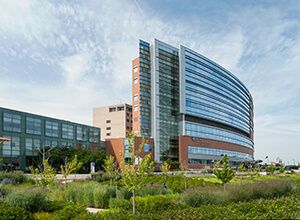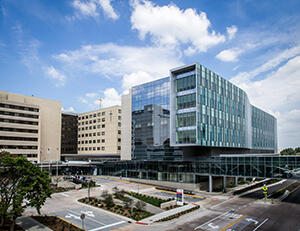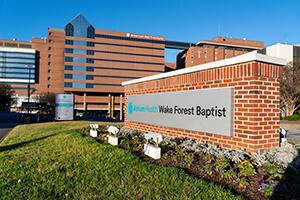Wake Forest University School of Medicine sits at the heart of a growing family.

In 2022, the combination of Atrium Health and Advocate Aurora Health created the new Advocate Health, the nation’s third largest nonprofit integrated health system, with headquarters in Charlotte, N.C. Having served as the academic core of Atrium Health, Wake Forest Baptist Medical Center, anchored by the School of Medicine, immediately became the powerful engine tasked with driving Advocate Health’s evolution as an academic Learning Health System.
The Advocate Health enterprise includes 67 hospitals in six states — Alabama, Georgia, North Carolina and South Carolina in the Southeast, and Illinois and Wisconsin in the Midwest — caring for nearly six million people a year. And the School of Medicine has the distinction of serving as the key component of the academic core for the entire enterprise.
“While Advocate Aurora in the Midwest has relationships with and learners from other medical schools, the opportunity to have a ‘family’ relationship with Wake Forest University School of Medicine is exciting,” says Terry Hales, MBA, executive vice chief academic officer for administration for Advocate Health and chief operating officer of the Health Sciences System.
“They are so proud to be aligned with Wake Forest University School of Medicine. They see the power of what this is going to bring in the coming years. They’re part of this Wake Forest family now.”
Expanding Education and Training

According to Thomas Hansen, MD, Advocate Health’s vice chief academic officer for clinical training and education, the new alignment with the School of Medicine is already affecting education and training. Based on the current number of residents and fellows across the enterprise, Advocate Health is training more than 1% of all residents and fellows in the nation.
There are more than 200 residency and fellowship programs across Advocate Health, training more than 2,000 residents and fellows. Atrium Health Wake Forest Baptist Medical Center has the most residency and fellowship programs within the enterprise.
“If one of my internal medicine residents in the Midwest is interested in pursuing a hematology/ oncology fellowship, they are able to look within the enterprise for that opportunity, including going to Wake Forest Baptist,” Hansen says. “These residents could stay within the enterprise for their education, and hopefully we will recruit them to join the faculty.”

While residency training in Winston-Salem remains an excellent choice for many, Advocate Health’s size, with 11 teaching hospitals, creates options for students, whether for clinical rotations while in medical school or residency training following graduation. Fourth-year Wake Forest MD students may be able to spend clinical training time in areas other than Winston-Salem or Charlotte.
“This opens up opportunities for students to engage in a clinical learning environment that is right for them,” Hansen says. “If their interest is in rural medicine, we have residency programs in rural Georgia and Wisconsin. If they’re interested in a large urban environment, they could do their rotation in Chicago.
“Having this association with teaching hospitals in North Carolina, Georgia, Illinois and Wisconsin, there may be a natural draw for students who are interested in going to Wake Forest for medical school, knowing they potentially could do rotations back home.”
Leading Large-scale Research

Amit Acharya, PhD, believes aligning with a medical school of Wake Forest’s caliber will bring needed resources to Advocate Health researchers and a large patient population base for the School of Medicine’s clinical research, which will mean greater opportunities to improve health.
As president of the Advocate Aurora Research Institute, chief research officer and system vice president, Acharya sees Innovation Quarter in Winston-Salem and The Pearl innovation district, being built in uptown Charlotte, as assets that will help connect promising research with industry partners.
“This is almost an end-to-end system where an idea gets tested out, and if it works, we can see it through to the finish,” Acharya says. “We have those mechanisms to test it in a clinical setting or in a population setting, then we can partner with industry. That’s enticing for me as a researcher and a clinician. That’s the number one advantage of Wake Forest serving as our academic core.”
The alignment also provides opportunities for thousands of health care professionals throughout the enterprise to benefit from its academic core.

“This is not just any medical school,” he says. “It’s an internationally well-recognized medical school that focuses on evidence-based practices and translating research into care delivery. Having Wake Forest serve as an academic core for our entire health system provides that opportunity for all our researchers and clinicians to be part of this large family.”
With a larger clinical system comes a greater need for not only health care providers but also leaders. The school’s PA and academic nursing programs are positioned to help fill both needs. A new doctoral degree program being offered through PA Studies that focuses on building leadership and research skills for PAs is one example.
Expanding the range of opportunities also could address a critical problem in health care: burnout. Acharya believes one way to address burnout is to offer medical professionals options for taking part in research and education that could give them a break from the demands of clinical care.

“Wake Forest provides such a broad area of research opportunities for clinicians here in the Midwest,” he says. “Having the opportunity to help educate the next generation of medical professionals is also important for many of our colleagues. Not every physician or clinician will want to do all these things, but the options are available to them. Wake Forest brings that to the equation.”
Acharya believes that placing the School of Medicine at the center of the enterprise will be noteworthy.
“This is a game changer for health care,” Acharya says. “I have no doubt that when we look back in five or 10 years, what we are doing here is going to be so unique, not just nationally, but the international community will be looking at us.”
